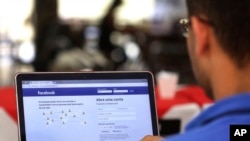Social media giant Facebook said Friday that it would begin to prioritize "trustworthy" news outlets on its site in order to counteract "misinformation."
The company said it would ask its more than 2 billion users to rank the news organizations they trusted in order to prioritize "high-quality news" over less trusted sources. It said the new ranking system would seek to separate news organizations trusted only by their own subscribers from ones that are broadly trusted across society.
Facebook Chief Executive Mark Zuckerberg wrote in a blog post that the company was not "comfortable" deciding which news sources are the most trustworthy in a "world with so much division."
"There's too much sensationalism, misinformation and polarization in the world today," he wrote.
"Social media enables people to spread information faster than ever before, and if we don't specifically tackle these problems, then we end up amplifying them," Zuckerberg added.
Outside experts rejected
He said Facebook considered asking outside experts to choose the most reputable news sources, but that doing so would most likely have led to an "objectivity problem." He said the company decided to rely on member surveys as the most "objective" way to rank trust in news sources.
Zuckerberg said it's important that Facebook's News Feed "promotes high-quality news that helps build a sense of common ground."
He also announced that Facebook would shrink the content on its News Feed from 5 percent to 4 percent. This means users will see fewer posts from news organizations while scrolling through their feeds in favor of more posts from friends.
Facebook has been struggling with how to handle its distribution of news in an era of fake news and claims of media bias.
The social media company has faced accusations that it helped spread misinformation as well as Russian-linked content meant to influence the 2016 U.S. elections.
Also last year, U.S. Republican lawmakers expressed concern that Facebook was suppressing stories from conservative news sources.
The Pew Research Center has found that more than two-thirds of Americans are getting at least some of their news from social media, making such outlets prime sources of information.






